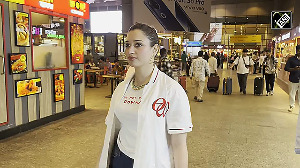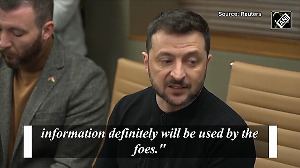The rising incidence of terror group financing following the September 11 US bombings has seen the US and UK banks putting pressure on their Indian correspondence banking counterparts to check money laundering.
"It is not just correspondence banks but inter-governmental pressure on India from the US and UK governments to ensure regulations and surveillance systems are in place," said banking sources.
Terror group financing accounts for just 0.2 per cent of the total $856 billion money laundered worldwide. "However, while this amounts to just $1.72 billion, the US regulations came into force only on account of terror group financing since this segment of money laundering has the potency to cause havoc for the global economy," said Hanuman Tripathi, manging director, Infrasoft Technologies Ltd.
Infrasoft is one of the leading players offering anti-money laundering solutions. All banks registered in the US are bound by the Office of Foreign Assets Contract and the Patriot Act, which came into place in November 2001 following the terrorist attack in the US.
The UK banks follow the Financial Act Task Force guidelines, similar to those brought out by the United Nations on money laundering. These norms specify that banks need certain checks and balances when it comes to opening bank accounts and transfering funds.
"The Reserve Bank of India has recently set the wheels in motion by giving scheduled commercial banks a deadline of December 31 to tighten and check money laundering by adequate processes," said a senior executive looking after the anti-money laundering cell at a private sector bank.
Even as global correspondence banks had put pressure on their Indian counterparts months ago, the latter were awaiting the central bank to come out with necessary directive before taking a decision on such large investments.
Bank of India has bought a money laundering solution for its UK operations from InfrasoftTech.
Asia-Pacific accounts for 30 per cent of money laundering, while the Americas (North America and South America) account for the highest 38 per cent of it.
Europe accounts for 27 per cent and the Middle East just five per cent as per the latest available worldwide statistics. Contrary to popular belief, terror financing makes up just 0.2-0.5 per cent of the total $856 billion of money laundered.
Over 34 per cent is on account of drugs and 19 per cent due to smuggling of precious commodities, which offer a price differential. The balance is on account of white-collared crime including siphoning of funds and corruption.
Though no specific figures are available as to what percentage of money laundering stems from India, according to Central Vigilance Committee, black money accounts for 40 per cent of India's gross domestic product.






 © 2025
© 2025